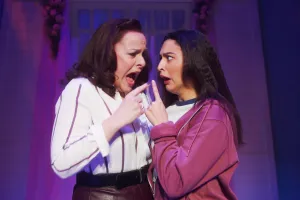Honour Bayes: In praise of the preview
Last week I was lucky enough to squeeze into the last preview of Ten Billion before it was opened up to the critical gaze. As a critic this was a pleasure because I don’t usually go pre-press night. As a person it was a pleasure because I realised something fantastic: preview audiences really do count.
This may sound obvious but with the rise of the internet, previews have come under a bit of an assault recently. With bloggers and tweeters giving their thoughts from the off, what’s the point of this tender final stage of creation? But I think they are still a vital part of any theatrical process. The power of the preview certainly hit me like a truck on Tuesday.
As I entered the space and sat there amongst the usual buzz of the audience, I realised something was very different. Katie Mitchell and the entire creative team were sat behind me for a start. They could hear everything we said. My reactions were being noted, to be given as notes later.
Everyone recognises that theatre’s strength is in the symbiotic relationship between the artist and audience. But how many times does this really ring true; sadly I’d say that when it does happen it’s still a surprise.
But in a preview these moments feel closer to hand – or at least in this one they did. Perhaps it was the intimacy of the Jerwood Theatre Upstairs. Or perhaps it was the physical recognition of Mitchell’s response, the keyboard signalling when an adjustment was being made. Either way I’ve never felt more like my reaction was part of the conversation of the piece.
How can this be when I’m a reviewer? My opinion is felt, for better or worse, all the time. But as writer Jake Orr points out the dictionary definition of a review is the “examination of something with the possibility of instituting change if necessary”.
For all that one wishes that thoughts in reviews may impact on work (an egotistical dream or not), there is a sense that once a critical stamp has been put on it, however fluid the artists involved are, the structures of a show are set.
Maybe I’m wrong, but how many artists have changed shows because of a review, whereas shows in preview change drastically because of audience reaction. Lyn Gardner has even gone so far as to suggest that producers should pay audiences during the preview process (a tongue in cheek thought, which I genuinely love).
Tom Parry, of Edinburgh Fringe aficionados Pappy’s, said a few days ago that after months of previews he felt their show was completed. I couldn’t help thinking that in a way the audiences at those shows have been the fourth member of this renowned sketch group.
The received wisdom is that audiences should pay less for previews. In terms of quality this is absolutely right: War Horse had a disastrous first preview yet continues to have a triumphant run post press night. It wouldn’t be fair for each audience to pay the same. But in terms of experience a preview is not a cheaper option. It’s a real chance for an audience to stop being a silent partner in the theatrical relationship.












